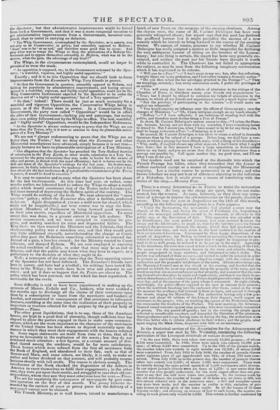Some difficulty is said to have been experienced in making
up the accounts of Messrs. Esdaile and Co., bankers, who were enabled a few months ago to discharge all the claims of their customers upon them by a subscription or loans from the merchants and bankers of Loudon, and consented in consequence of that assistance to relinquish business, confiding at the same time the realization of their property to Inspectors or trustees selected for that purpose by the general body of creditors.-- Times. The other great liquidations, that is to say, those of the American houses, are kept in a good deal of obscurity, though sufficient time has elapsed to allow the parties engaged in them to make some communi- cations, which are the more important as the character of the merchants of the United States has been shown to depend materially upon the manner in which they meet their engagements with the 'louses referred to. Some vague statements are made from time to time, that all is going on favourably in the realization of the assets ; but they do not command much attention : a few figures, or a certain amount of divi- dend shared among the creditors, would be far more satisfactory. Those houses which were refused from the first all assistance from the Bank of England, and abandoned to their fate, such as that of Gowan and Marx, and some others, are likely, it is said, to make an earlier and better dividend on that account, and will probably resume business shortly with full credit. The reason is obvious enough. The interference of the Bank checked the disposition of the debtors in America to exert themselves to fulfil their engagements ; in the other case, they were put upon their mettle, and struggled to save their old cor- respondents, whom they saw they must otherwise lose for ever.—Times.
The act for regulating the conveyance of newspapers by post came into operation on the first of this month. The penny hitherto de- manded by the carriers of cross or penny posts for the delivery of a newspaper cannot now be claimed. The French Ministry, as is well known, intend to manufacture a
batch of new Peers on the occasion of the ensuing elections. Among the chosen ones, the name of M. Casimir Delavigne has been very generally whispered about ; but report says that the poet has declined the proffered honour lest it might prejudice the success of a new comedy which be intends to bring forward in the course of the ensuing winter. We cannot, of course, presume to say whether M. Casimir Delavigne has really assigned a motive so little respectful for declining the very ambiguous honour of sitting on the benches of the Luxem- bourg; but one thing is certain, the report has been very generally cir- culated, and neither the poet nor his friends have thought it worth while to contradict it. The Charivari has not failed to appropriate the subject, as may be seen from the following imaginary conversation which it has registered in its colums. " Will you be a Peer?"—" I don't mean to say no ; but, after due reflection, it might injure me in my profession, and I had rather remain a dramatic author." "Do you then refuse the fair privileges attached to the Peerage? "—" They are tempting, certainly; but, every calculation made, I prefer the privileges at an author."
"You will every day have two tickets of admission to the sittings of the Chamber of Peers, to distribute among your friends and acquaintance.'— " True ; but I should be obliged to renounce my tickets of admission to the theatre, to which all my friends and acquaintance attach a much higher value." "But the privilege of participating in the debates."—It would make me neglect my rehearsals." "You would exercise an influence over the affairs of Governrrent ; over the changes of Ministries."--" Oh, I have intrigues enough on my hands already." "Reflect."—" I have reflected ; I am ambitious of standing well with the public, and therefore must decline being a Peer of France." In short, M. Casimir Delavigne's answer conies to this—" I refuse the Peer- age, because, having not yet done with my comedies, I have something better to attend to. But I assure you, when 1 have ceased to be fit. for any thing ens, I shall be happy to become a Peer."—Flattering, is it not? Be assured, M. Casimir Delavigne is less likely to create a school in dramatic literature than by his refusal of a peerage. Before long, we shall bear a tner- chant, to whom a peerage has been offered, reply, with a shrug of his shoulders— "Why, really, if you:had chosen any other moment, I don't know what I might have done ; but at this moment I have a large speculation in India-rubber shirts on my hand, and you are aware that that is of more importance than is peerage can possibly be. Call again another day, my good man, and I'll see what I can do for you." Our readers need not be surprised at the discredit into which the French Peerage has fallen, when they remember that the honour is seldom conferred except as a means of strengthening the Ministerial majority. Let a similar course be persevered in at home ; and who knows whether we may not hear of aldermen objecting to the infliction of a Dukedom, lest it might prove a means of interfering with the duties of the shop.—Morning Post.


























 Previous page
Previous page